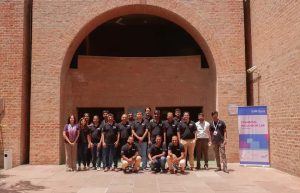How important are ‘People’ to a startup, especially while scaling up?

Ben Horowitz, in his book ‘Hard Things about Hard Things,’ sums up the importance of building a healthy company culture –
“A healthy company culture encourages people to share bad news. A company that discusses its problems freely and openly can quickly solve them.”
A startup, at its core, is a problem solving entity seeking answers to multiple questions — Who are the customers? What do they need? How to scale up? Is having a product-market fit or funds enough? Busy with these questions, a key component is forgotten — its People. Often reduced to a hiring or compensation issue, the smallest cracks threaten to become unmanageable threats when scaling up.
For the uninitiated, 9 startups have been selected as part of the 2nd cohort of Financial Inclusion Lab and are being supported in identifying and validating sustainable scale-up strategies to serve the low-and-middle income (LMI) segments. The 1st workshop conducted in April focused on customers and the market game. When deep diving into the challenges of the cohort, ‘People’ started appearing as a major challenge while scaling up. So it was time for the cohort of the Financial Inclusion Lab to start getting their organisations right with a 3 day workshop on “Organisations and People.”
The 3 day capacity building workshop was scheduled in the 1st week of June. Each day of the workshop was focused on one key theme to help the startups think and get insights on how to manage and understand people in an organisation.
Organisational Design and Structure by Prof. Amit Nandkeolyar, IIMA
The workshop started with the challenges that startups face in their organisations. He spoke about ‘Why and when do teams do better than individuals?’ and how successful teams work. With various exercises and frameworks, the participants got to understand the subconscious aspects of culture and how building the right culture needs to be a conscious effort by every startup co-founder. The startups were guided on designing the structure and how it should be linked with the organisational goals and strategy.
Also, Mr. Yogesh Bhura a serial entrepreneur shared his journey and the challenges he faced. He runs and manages IQ Capital Holdings Pte Ltd (Singapore), is an Advisor to Swedish private equity fund EQT and on the board of Singapore based InCorp Group and Ethixbase. Among other insights, he asked the startups to focus on one very important function of the organisation — Sales. He highlighted the importance of the time spent in sales which as per him should be atleast 70% of the time spent by a CEO.
Human Resource Management by Prof. Aditya Moses, IIMA
The 2nd day of the workshop highlighted how onboarding and training play a vital role in an organisation. The startups worked on their plans including recruitment, retention, training, compensation and benefits. A key insight that reverberated with the startups — ‘Talent’ is contextual. A highly skilled person might not be the talent your startup is looking for. During the day, he emphasized upon a framework for founders to define the HR policies and initiatives i.e. Ability, Motivation & Opportunity. At the end, he urged the founders to let go of the biases linked to the term ‘HR’.
Leadership by Prof. Neharika Vohra, IIMA
The last leg of the workshop was all about the tasks performed and mistakes made as a startup founder. The day dawned with a realisation about how subordinates usually end up doing all the boring tasks and how a founders can become the bottleneck. Highlighting the importance of delegating right she revealed a few mantras stated below:
1. As a leader, learn to ‘Let-go’
2. Know when to delegate and when to assign it to your employees
3. The authority should be with the subordinate but the responsibility should be with the superior
4. Assigning a task is contextual depending on the individual and time
During the 3 day workshop, the facilitators cited Greenway Grameen in their discussion on certain important concepts. Ankit Mathur, the co-founder of Greenway Grameen left the crowd raptured in his last session on the second day, sharing his journey and the challenges he faced while taking decisions on structure and hiring. As a leader himself, Ankit had one key learning to motivate team — ‘Arrive before them and leave after them.’
At the end of the workshop, startups were left pondering on strategies to ready their organisations and people for scale up. Some of the questions highlighted during the workshop were about:
1. Culture
2. Communicating values to the employees
3. Recruitment of right people at the right time at right salary
4. Offering growth path to employees
5. Organisational design, structure and its implementation in adynamic and ever-growing environment
Incubators often neglect key lessons on people management for their startups, which affects these startups especially when scaling up. At IIMA Ventures, we’ve taken steps to set this right. We are open to hear from more founders on their organisational challenges and help them overcome it. Do write to us if you have something to discuss.
